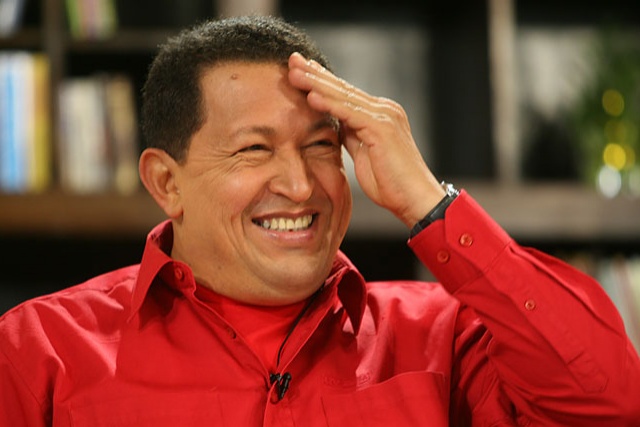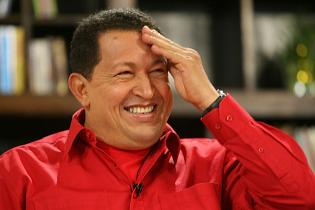Venezuela: Significance of Chavez Victory
Notwithstanding a bitter opposition campaign accusing him of unfairly using Venezuela's oil wealth and his near total control of state institutions to his advantage, President Hugo Chavez, as expected, has won a new popular endorsement of his socialist project as well as a third consecutive term for another 6 years.
Chavez received more than 54 percent of the vote to 45 percent for challenger Henrique Capriles, an athletic 40-year-old former state governor who unified and energized the opposition while barnstorming across the oil-exporting nation. Capriles also narrowed Chavez's margin of victory to his smallest yet in a presidential contest. Voter turnout was an impressive 81 percent, compared to 75 percent in 2006..
President Raul Castro of Cuba, which could have been badly hurt by a Chavez loss, was among Latin American leaders sending warm congratulations to the former paratrooper on his victory after nearly 14 years in office. "I can't describe the relief and happiness I feel right now."
People celebrated Chavez’s victory. Fireworks exploded over downtown Caracas amid a cacophony of horn-honking by elated Chavez supporters waving flags and jumping for joy outside the presidential palace. "The revolution has triumphed!" Chavez told the crowd, saying his supporters "voted for socialism”. "The revolution will continue, thanks to God and the people of this great country," said Gonzalez.
It was Chavez's third re-election in nearly 14 years in office. Chavez pledged before the vote to make a stronger push for socialism in the next term. He's also likely to further limit dissent and deepen friendships with U.S. rivals. He will now have a freer Capriles has accepted defeat and congratulated his rival shortly after the electoral council's announcement.
Apparently, Capriles' promises to seriously address violent crime that has spun out of control; streamline a patronage-bloated bureaucracy and end rampant corruption proved inadequate against Chavez's charisma, well-oiled political machine and a legacy of putting Venezuela's poor first with generous social welfare programs. Chavez spent heavily in the months before the vote, building public housing and bankrolling expanded social programs.
None can deny the affinity and gratefulness Venezuela's poor feel for Chavez. Chavez spoke little during the campaign about his fight with cancer, which since June 2011 has included surgery to remove tumors from his pelvic region as well as chemotherapy and radiation treatment."Despite his illness, he retains a large emotional connection with a lot of Venezuelans that were not prepared to vote against him.
Despite winning a February primary that unified the opposition, Capriles proved no match for Chavez's electoral prowess. A Capriles victory would have brought a radical foreign policy shift including a halt to preferential oil deals with allies such as Cuba, along with a loosening of state economic controls and an increase in private investment
The victory means that Chavez will be in office until February 2019, making him the hemisphere's longest-serving leader
The country has the world's largest proven oil reserves. Chavez deserved to win for spreading the nation's oil wealth to the poor with free medical care, public housing and other government programs.
Chavez maybe power-hungry what really matters is he is out of touch with problems such as a stunted economy, rising crime and the increasing polarization of society.
In office since February 1999, Chavez has in many ways transformed Venezuelan society, channelling the nation's torrent of oil dollars into social welfare projects called Missions that deliver free medical care, housing, education and cut-rate groceries to the nation's poor. But he also has dramatically polarized Venezuelan society with government takeovers of ranches, farms and businesses, and by characterizing political opponents in insulting terms. Chavez was briefly toppled by a coup d’état in 2002 for which he blames the "squalid ones," meaning the rich and middle class.
A Chavez defeat would have reverberated far beyond Venezuela's borders. Many aspects of Chavez's socialism, as well as his populist and autocratic political style, have been emulated in other Latin American countries, including Ecuador, Bolivia, Argentina and Nicaragua. His disappearance from the political scene could have had the effect of emboldening opposition in those countries. If not now, political change could come in just a little while investors might consider buying beaten-down Venezuelan bonds.
Even with his re-election, some observers think Chavez's socialist regime is running on borrowed time, that his cancer will probably kill him or force him to resign in the next couple of years. If that happens in the first four years of a six-year term, his opponents feel, another presidential election must be held, according to the Venezuelan Constitution, a race Capriles or another opposition opponent could win without Chavez around to galvanize his support base of mainly poor and working-class voters. However, Chavez has put to rest such speculations.
President Hugo Chavez put to rest any doubts about his masterful political touch in winning the fiercest battle in his political career.
Chavez victory would strengthen socialist forces in the world and he could be the centor of anti-imperialist, anti-capitalist and anti-colonialist forces globally effectively opposing dictatorial American/NATO terror moves. Venezuela could emerge as the focal point for all truly democratic forces and ideas.
Now the world would look forward to witnessing his socialist reforms to further the cause of the poor and common masses.
Comments
There are 0 comments on this post













